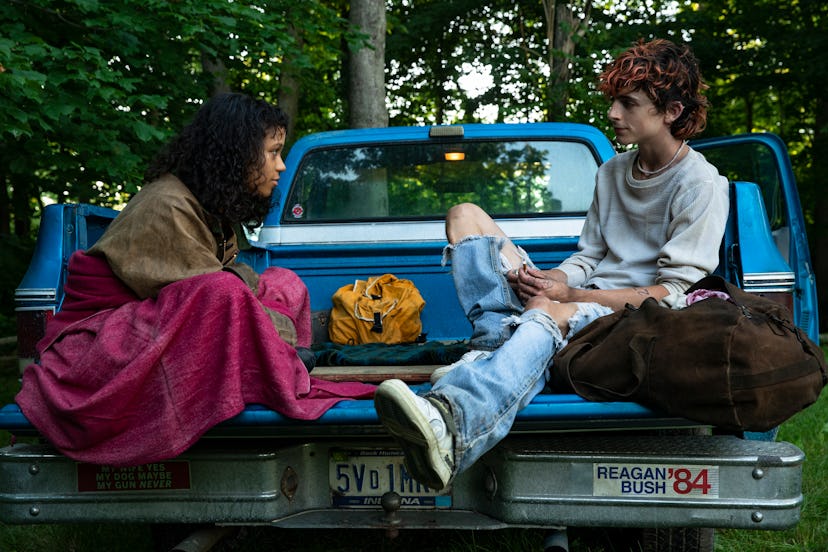Watch out: spoilers ahead.
A cross-country road trip. Late-night bonfire pit confessions. Two bodies finding belonging in one another. Luca Guadagnino’s Bones and All hits all the seminal beats of a romantic drama—and it’s undoubtedly the romance of the year, overflowing with visceral pining and slow sunsets. That classification may come as a surprise, considering this deliciously dark film follows two hungry cannibals falling in love amid a battle to resist their instincts.
An adaptation of Camille DeAngelis’s 2015 young adult novel of the same name, Guadagnino’s brooding retelling delves into the violent afflictions of teenage Maren (a superbly unshielded Taylor Russell). Guadagnino has long held quite the penchant for tinkering with desire. From Call Me by Your Name to HBO’s We Are Who We Are, the director has an affinity for sun-soaked, big-hearted tales thrumming with yearning. But Bones and All, in theaters November 23, is perhaps his most challenging reckoning with romance to date. With the DNA of a coming-of-age film and the visuals of a horror fashioned through a cannibalistic lens, the awakening of bloodthirsty urges makes for an unorthodox depiction of young love.
Repulsed by her innate cravings, Maren’s denial is fuel on the fire as she ventures across the sprawling barrenness of late-’80s America in search of her missing mother, bodies to feast on, and running from the stain of death blanketing her body. During her aimless wandering, she meets fellow “eater” Lee (Timothée Chalamet), a wounded young man whose angular beauty is encased by sharp masculine insecurity. Torn between their mind’s morals and their belly’s hunger, the pair bond over a shared ravenous appetite and contention with their forbidden identities.
Taylor Russell as Maren and Timothée Chalamet as Lee in Bones and All.
Their killings are in the name of self-service as they pick off a few bumpkins and lure loners into their deadly spider web, all the while reassuring themselves and each other. “You don’t think I’m a bad person?” Lee asks. Maren replies: “All I know is that I love you.”
Guadagnino executes moments of intense violence through Maren’s perspective, making Lee an object of eroticism. In the pair’s first meeting, the young man emerges with blood dripping down his jaw, pooling in his collarbones and running over his pale chest. It’s a replica shot of a love interest emerging, dampened and disheveled, from the ocean—but here, with a viscous, rouge fluid. Guadagnino frames this voyeuristic moment, like so many others, with electric seductiveness, endeavoring to make sense of love despite the deplorable.
Horrifying and yet humanistic, Guadagnino finds empathy with these two wandering souls. Bones and All is uninterested in spectacle, but patient in telling the blistering love story that develops between the pair. Metaphorical semantics of romance are taken literally by Guadagnino. Symbolic notions of giving away your heart and getting under someone’s skin are visualized with bloody hands ravishing bodies, teeth puncturing skin, and hearts ripped from chests that are cradled ever so gently. Devouring their victims is a place marker for unconditional love; this intensity of feeling isn’t always digestible, but Guadagnino paints a portrait of loving someone so much that you could eat them alive.
One evening, Maren watches as Lee seduces a carnival worker under glowing neon lights. Taking him into a nearby cornfield, Lee has sex with the man in an evocative moment ripe with sensuality. Just as he’s about to orgasm, Lee slits his throat. Cinematographer Arseni Khachaturan frames the killings as disturbingly bewitching, a contrasting mood to the unfolding gory violence. The cannibalistic climax comes with Lee and Maren’s moonlit feast, a rush of animalistic instinct that leaves them woozy, gorged, and bloody.
The line between ghastly horror and sweeping romance blurs so effortlessly; to not be loved is a terrifying possibility, but even more stomach-churning is the thought of being seen for who you are and loving still wholeheartedly, hoping for reciprocation. Vulnerability should be the antithesis of a killer, yet in Lee, Maren finds someone who not only understands her on a cellular level, but recognizes the misery and guilt that course through her veins.
The formative, carnal need that bonds the pair rests on this indefatigable impulse—leading them from town to town, leaving a trail of human remains in their wake. Bones and All manages to find poetic empathy, even beauty, in the tragedy of morbid romance. Cannibalism so often regards the exterior. But here, Guadagnino peers inward, finding a story about longing to be loved that’s sharp around the edges, with a gooey center that oozes syrupy romanticism.
